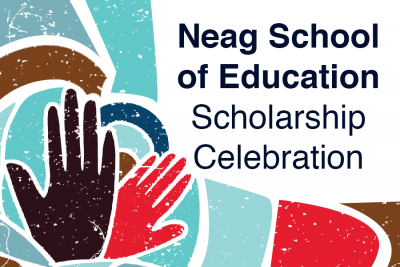Yahoo! News (Casey Cobb quoted)
Website Developed By Neag School Will Assist High School Teachers
Editor’s Note: The following piece was originally published by UConn Today.
Connecticut is the first state to mandate that all of its high schools offer an elective class on Black and Latinx history, and this website will provide resources.

Connecticut is the first state in the nation to mandate that all of its high schools offer an elective class on Black and Latinx history. These classes must be taught by the fall of 2022, but many high schools have added them to the curriculum this year.
Alan Marcus, a professor of curriculum and instruction in UConn’s Neag School of Education, has led a team that developed a website to assist high school teachers with the instruction of this course.
“After the law was passed, I was talking to a number of teachers and they were struggling with how they would teach this class, because it is brand new,” says Marcus. “They just weren’t prepared to teach this very specific course. They were prepared to teach U.S. History, very broadly, but this is very narrow.”
Marcus assembled a team of current Connecticut high school teachers, many of whom are Neag graduates, and current graduate students in Neag, who have already been out in the field as student teachers. They built a website that contained resources that are useful in teaching this course.
“There were not a lot of resources to start with,” says Crista Penrose ’12 (ED), ’13 MA, a history teacher at RHAM High School in Hebron who was part of the team. “There just are not a lot of materials already created that focus on just the Black or Latin experience. So, we took the draft version of the curriculum the state provided and went through it piece by piece. The goal was to find primary sources, rather than have other historians tell the story. We wanted to find documents and images that were created by Black and Latin communities so they could tell their own story.”
“There were some areas where we could find a list of 25 great primary resource and other areas where there we only two or three.”
— Alan Marcus, Professor
Marcus says this new course is different from others that the state has mandated because there was much more direction on what the curriculum should be, which was developed by an educational entity.
“This is definitely a hot topic right now,” says Marcus. “If we had this conversation a few years ago, people would not be so up in arms. There is a lot of conversation around race and Critical Race Theory and people on both sides feel like their voices are not being heard.”
The website directs high school teachers to a number of different kinds of resources to use – from traditional readings, to films and historical fiction.
A number of criteria were used when analyzing what materials should be selected for the website. They had to fit a particular unit in the course and had to be interesting for students.
“We also evaluated how appropriate, in a number of ways, a piece of material was,” says Marcus. “We had to pick materials at various levels of reading for teachers working with students who are below grade level and also for teachers working with student at an honors or AP level.
“There were some areas where we could find a list of 25 great primary resource and other areas where there we only two or three.”
Marcus, who was a high school history teacher himself earlier in his career, says there has long been a desire from educators to change the way history is presented to students.
“There’s been a push for a long time for the history curriculum in high school to be more inclusive,” says Marcus. “Very broadly, at least among those of us who teach history and are interested in history education, history is taught from a white, male, European point of view.
“I do an exercise with my student where they look at chapters on a particular topic from a text book published in the 1940s, then the 1950s, the ‘60s and so on, and how it changed. We talk about what happened in the past hasn’t changed, but how it is presented in text books has changed.”
The course will provide high school students a structured look at Black and Latinx issues and prepare them to have real world conversation and interactions when they graduate.
“Race is on the minds of everyone in the public because it is such an important driving force in the way our politics are played out,” says Jay Garrish ’15 (ED), ’16 MA, who teaches history at South Windsor High School and was also part of Marcus’ team of educators. “It’s really important for high school students to understand the conversations that are happening out in the open today in a way that is grounded in history.
“With that context of this course, I want them to be able to formulate their own opinions and enter the conversations that happen in everyday life in a really productive way, instead of being one of those that sit in the comments section of social media and rattling off whatever views they have on key issues. They are going to leave high school and may never take another history class again. They have to be equipped to have these conversations they will encounter.”
Mercy High School Welcomes New Teachers in Middletown
The Middletown Press (Neag School alumnus Justin Michaud is mentioned)
Neag School 2020-21 Annual Report Highlights
Preserving American Democracy – Adequate and Equitable School Funding
Teacher Stories (Preston Green is a panelist on school funding)
A Lifeline for Families Seeking Access Special Education Services
UConn Today (Alumna Shay Cantner featured)
Annual Scholarship Celebration Spotlights Students and Donors
 This past week, UConn’s Neag School of Education held its annual Scholarship Celebration to commemorate the students who have benefitted, financially and personally, from the generosity of numerous donors. Students highlighted their personal experiences and gave thanks to the individuals who helped them turn their educational dreams into reality.
This past week, UConn’s Neag School of Education held its annual Scholarship Celebration to commemorate the students who have benefitted, financially and personally, from the generosity of numerous donors. Students highlighted their personal experiences and gave thanks to the individuals who helped them turn their educational dreams into reality.
The virtual ceremony was hosted by Jason G. Irizarry, the Neag School of Education dean, who began the celebration by shedding light on how impactful these scholarships are to students and the entire Neag School community.
“We are here to congratulate this year’s deserving student scholarship recipients — tomorrow’s education researchers, sport management professionals, teachers, and school leaders,” he said. “At the same time, this event would not take place without our generous donors; they are the individuals who help make our students’ educational journeys here at the Neag School possible.”
This past year alone, the Neag School distributed more than $267,000 in scholarship aid to deserving students.
Brianna Chance, an undergraduate pursuing an Integrated Bachelor’s/Master’s degree in music education, is one of this year’s student scholarship recipients. Through a difficult upbringing, Chance turned to music to distract her from what was happening in her personal life; however, this distraction quickly turned into a passion. Nonetheless, Chance says she had always felt college was a distant dream until she arrived at UConn and found her place.
“When I began attending UConn, I discovered the importance of a chosen family,” she said. “My professors, advisors, and classmates emulated this supportive familial structure I was not privy to.”

Not only has her scholarship helped her financially, but it has also allowed her to allot less time to work and more time to endeavors that truly interest her.
“As I embark on my third year at the University of Connecticut, my heart is overwhelmed with the amount of love I have received thus far,” said Chance. “Three years ago, I could not have predicted that I would be conducting activism on campus, running a volunteer organization to support independent students, serving as a mentor for my fellow UConn Huskies, and excelling in my studies.”
Paying It Forward
Carmen Effron ’81 MBA, a benefactor and dedicated member of the Neag School Dean’s Board of Advocates, was able to join the Scholarship Celebration and share her personal story on why helping students is so important to her and her family.
Her father, an Italian immigrant, had to return to the first grade upon arriving in America to learn English. He later received his BA and MA degree from Boston College in education and eventually became a teacher. Unfortunately, he passed away when Effron was 18 years old.
“The one thing that was incredibly unexpected and a terrific way of honoring my dad was that the faculty at Woodbury High, which is where he spent the last 17 years of his career, put together a memorial scholarship for myself and my four sisters,” she said. “It made me feel special and pleased and happy that someone was taking the time to look out for us.”
Effron started out studying education at UConn but switched to business. She went on to create CF Effron Company and now honors the memory of her father by contributing financially to students in need. This year one of the recipients of her scholarship fund is Angela Chen, a senior pursuing a secondary education degree with a concentration in social studies.
Chen says she never imagined she would be able to attend college; financial burdens were harsh, but through the help of scholarships, she has immersed herself as a student and grown as an individual.
“On behalf of all the scholarship recipients this year, I promise that we will not let you down, I promise that we will serve the next generation of students and believe in them the way that you believed in us.”
– Angela Chen ’23 (ED), ’24 MA
“Even though I am just one student and one life that has been changed, I want you to know that you do make a difference in the lives of all students that you decide to support,” she said. “On behalf of all the scholarship recipients this year, I promise that we will not let you down, I promise that we will serve the next generation of students and believe in them the way that you believed in us, and I promise that we will try to make the world a better place one student at a time.”
As another student pointed out during her remarks, financial contributions helping Neag School students also indirectly impact the lives of future schoolchildren.
Mhret Wondmagegne, a junior studying elementary education, arrived in America from Ethiopia with little knowledge of the English language, similar to Effron’s father. However, her English language learner teacher not only helped her learn English but, she says, also allowed her to grow as an individual in an unfamiliar setting.
“She went above and beyond… she showed me that she cared about me as a person,” said Wondmagegne. “She believed in me so much that I started to believe in myself, and I hope someday to do it for a lot of my kids.”
Wondmagegne is committed to using the Degnan Family Scholarship she received to aid her in her future studies and help her become the best teacher she can be.
“I am excited to teach, to have my own classroom and kids that I will care for, teach, grow with and learn from,” she said. “However, just as excited as I am, I also know the reality of the difficulties in teaching and the struggles that can come up, which is why I am committed to preparing the best I can.”
How Reparations Can Be Paid Through School Finance Reform
The Conversation (Preston Green co-authors essay about reparations)
Charter Schools’ Scary Future
New Republic (Preston Green quoted)
